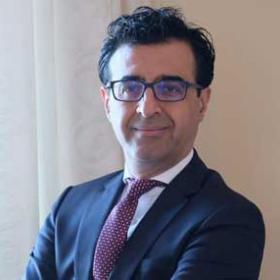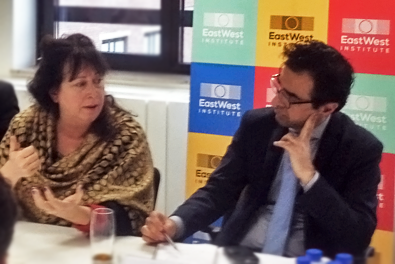
Discrediting ISIS from the Inside
The EastWest Institute’s Brussels Center organized a roundtable with Anne Speckhard, Adjunct Associate Professor of Psychiatry, at Georgetown University and Director of the International Center for the Study of Violent Extremism (ICSVE) on February 2, 2016. Speckhard shared insights into her newest research on reasons for joining and defecting ISIS, which was followed by a lively debate on how ISIS can be fought by discrediting their ideology.
The roundtable, under the Chatham House Rule, was attended by representatives of think tanks and NGOs, EU institutions, diplomatic delegations to the EU, Belgian miniseries and police, as well as consultancy companies.
ISIS is the most powerful, ruthless and well-funded terrorist group in recent history. Not only has ISIS managed to take and control a significant swathe of territory, it has become a de-facto state and a powerful foe. While a political solution in the war-torn areas of Syria and Iraq is a necessary precondition to the total defeat of ISIS, discrediting the group's ideology is also essential. Defectors from ISIS are among the most powerful first-hand voices to speak out against the group. Indeed a disillusioned cadre who can speak from experience and tell their authentic stories about life inside ISIS may be the most influential tool for preventing and dissuading others from joining ISIS.
The discussion revolved around ISIS’s attraction, induction and ideology, Sharia- and military training, as well as diverse motives to join the terrorist group, which include discrimination and marginalization in their societies as well as individual and family grievances. Based on her most recent published research, Speckhard delved deeply into the inner working of ISIS and explained that all ISIS cadres undergo Shariah training where they are imbued with a Takfiri ideology that enables them to deem all others, including Muslims, who disagree with ISIS’s extreme ideology, as apostates who should be killed.
Despite this indoctrination, all defectors (all are Syrians) experienced their Shariah trainers as a positive influence since they allowed them to deepen their own religious understanding. In this sense, Speckhard noted, these disengaged defectors remained radicalized “true believers.” They also had been given military training to handle weapons, explosives, and undergo exercises. Following these compulsory courses, these new members were sent to the front.
Syrians who join ISIS are rewarded with salaried jobs, which for young men translates into the ability to marry and for young women the money allows them to save their families from literal starvation. Foreign fighters receive additional rewards: wives, sexual slaves, and sometimes homes and cars. Daily life is punctuated by brutal practices—including floggings, torture and beheadings. Defections are the result of exposure to extreme brutality, disgust over the slave trade, observations of deep hypocrisy—a total mismatch between the words and deeds of Islam. Charges of corruption and complaints about battlefield decisions that produced unnecessary deaths in their own ranks were also causes of disillusionment. Speckhard concluded her presentation by saying that all interviewed defectors had come to hate ISIS and warn others not to join what they gradually came to see as a totally disappointing, ruthless and un-Islamic organization.
The participants reflected on these rare and fascinating first-hand stories as potentially very influential tools for preventing and dissuading others from joining ISIS, along with the necessity of comprehensive unorthodox de-radicalization programs that combine fair punishment and psychological treatment: rehabilitation and reintegration into society; and constant reassessment of the defectors’ steps in psychologically processing their often traumatizing experiences. Law enforcement and judiciaries in western countries will have to reform their policies regarding returnees, in order to contribute to their gradual reintegration into society, and use their stories to dissuade disgruntled and disenfranchised youth from joining ISIS. In addition, NGOs and civil society are indispensable partners for governments in de-radicalization and reintegration of ISIS defectors.

Anne Speckhard and Kawa Hassan

